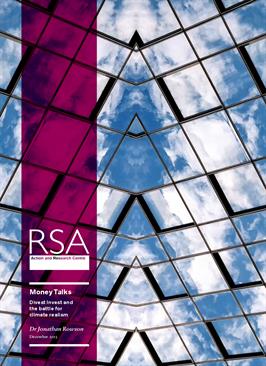We are the first generation to feel the effects of climate change and may be the last to be able to significantly mitigate them. The take home messages of the Paris Global Climate Summit will inevitably be ‘progress is possible’, ‘we could do better’ and ‘we need to keep at it’. The cultural question of what is ‘realistic’ is now the preeminent climate battleground.
Growing conviction about the causes and consequences of climate change combined with political and cultural leadership, technological innovation and financial risk assessments means there is significant momentum towards decarbonisation and genuine grounds for optimism about the direction of travel.
But the grounds for pessimism, particularly about speed, are still very strong. The world is heading for dangerous levels of atmospheric warming but climate change is still considered relatively unimportant by most people, and the global appetite for energy is likely to continue to grow, fuelled by the developing world’s legitimate desire to industrialise with low cost energy.
In this context, the importance of the distinction between merely ‘reducing emissions’, and reducing emissions enough, quickly enough, can hardly be overstated. This report examines the claim that if you want to limit planetary warming to levels deemed acceptable, the beginning of the end of the fossil fuel industry has to be accelerated. The corollary of this realisation is that investment in fossil fuels should end, which entails divesting (dis-investing) in coal, gas and oil and re-investing in alternative energy, particularly renewable energy, storage and transportation.
There are four main turns in the argument:
1. The unassailable logic: minimising climate risk is about doing whatever it takes to keep fossil fuels in the ground.
2. The unbelievable challenge: we are deeply dependent on fossil fuels and the requisite speed and scale of decarbonisation is hard to imagine.
3. The signal that sets the agenda: the ‘Divest Invest’ movement is needed to strengthen resolve and quicken the pace of the transition.
4. The map that yields momentum: the seven dimensions of climate change perspective (science, law, technology, money, democracy, culture, behaviour) gives us hope, by illustrating how the positive impact of acting in one dimension can have an important knock on effect on the others.
At a cultural level divestment stigmatizes the continued investment in fossil fuels, attempting to remove their social license to operate. At a technological and monetary level it signals to financiers that we are at the beginning of the end of the fossil fuel era, encouraging them to redirect their money towards new forms of research and infrastructure. At a democratic level, divestment challenges the political power of the fossil fuel industry as it manifests in subsidies. At a behavioural level, divestment wakes people up to their unwitting financial complicity in the challenge, and gives them a way of acting that feels commensurate with the global and systemic nature of the problem.
And all of these factors influence the regulatory ambience or ‘surround sound’ in which legal principles are considered and laws are made.
- Find out more about our project, The Seven Dimensions of Climate Change.
pdf 7.9 MB
Contributors


Join the discussion
Comments
Please login to post a comment or reply
Don't have an account? Click here to register.
I think part of the problem is that there tends to be a black and white look at fossil fuel use and not a widespread look at energy use in total. The EU is talking about reducing landfill & making things more able to be repaired or failing that easier to be taken apart and components reused. A great aim which also would cut down energy use that happens because of built in obsolescence. Many countries have agreed to target landfill and yet there is a continual push to demolish and rebuild so called energy efficient buildings and buildings that have a more limited life span than the old buildings they are replacing. As a third of all landfill is demolition waste and by the time the energy saving pays for the energy and resources used the building is ready for demolition. This is not really addressed by any government bodies and certainly not by local authorities. My point is that there needs to be a more holistic view of Environmental issues than is at present.